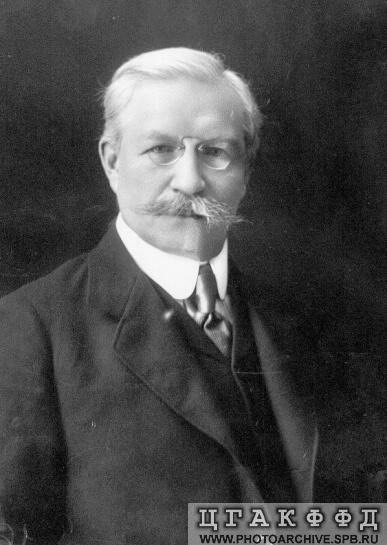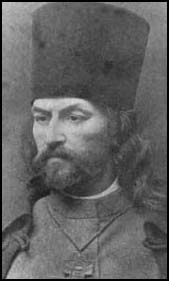<Back to Index>
- Founder of the Constitutional Democratic Party and Foreign Minister of the Provisional Government Pavel Nikolayevich Milyukov, 1859
- Priest, Workers' Leader and Okhrana Agent Georgiy Apollonovich Gapon, 1870
PAGE SPONSOR

Pavel Nikolayevich Milyukov (Russian: Па́вел Никола́евич Милюко́в; 27 January [O.S. 15 January] 1859 – 31 March 1943), a Russian politician, was the founder, leader and the most prominent member of the Constitutional Democratic party (known as the Kadets). His name is sometimes rendered in English as Paul Miliukov or Paul Milukoff.
Milyukov was born in the middle class family of an architect who claimed in his autobiography to be a nobleman from the House of Milukoff.
Milyukov studied at Moscow University, where he was influenced by the liberal ideas of Konstantin Kavelin and Boris Chicherin. He made a successful career as a historian, publishing the three volume Outlines of Russian Culture over the years from 1896 to 1903. The last volume was actually finished in jail, where he spent six months for his political speech at a private event (1901).
Having lost his position at the university due to political issues, Milyukov traveled widely and visited the United States several times. He also contributed to the clandestine journal Liberation in 1902.
When the First Russian Revolution started three years later, he founded the Constitutional Democratic party, represented it in the State Duma, and drafted the Vyborg Manifesto, calling for political freedom, reforms and passive resistance to the governmental policy. He was invited to contribute an analysis of contemporary Russia, based on his lectures at the University of Chicago and Boston's Lowell's Institute, to the University of Chicago Press; Russia and Its Crisis, which he penned in fluent English, was published by the Press in August 1905.
With the outbreak of World War I,
Milyukov swung to the right, promoting patriotic policies of national
defense, insisting his younger son (who subsequently died in battle)
volunteer for the army, and campaigning for the formation of the
Progressive Bloc of moderate leaders. Milyukov was regarded as a staunch
supporter of the conquest of Istanbul. His opponents mockingly called
him "Milyukov of Dardanelles". In 1916, however, he again moved to the
left, sharply criticizing the government for its inefficiency.
On 1 November 1916, during a speech in the State Duma Miliukov highlighted numerous governmental failures with the famous question "stupidity or treason?". According to Melissa Kirschke Stockdale in Paul Miliukov and the Quest for a Liberal Russia, it was a "volatile combination of revolutionary passions, escalating apprehension, and the near breakdown of unity in the moderate camp that provided the impetus for the most notorious address in the history of the Duma..." The speech was a milestone on the road to Rasputin's murder and the February Revolution.
At Progressive Bloc meetings near the end of October, Progressives and left Kadets argued that the revolutionary public mood could no longer be ignored and that the Duma should attack the entire tsarist system or lose whatever influence it had. Nationalists feared that a concerted stand against the government would jeopardize the existence of the Duma and further inflame the revolutionary feelings. Miliukov argued for and secured a tenuous adherence to a middle ground tactic, attacking Boris Stürmer and forcing his replacement.
According to Stockdale he had trouble gaining the support of his own party; at the 22 – 24 October Kadet fall conference provincial delegates "lashed out at Miliukov with unaccustomed ferocity. His travels abroad had made him poorly informed about the public mood, they charged; the patience of the people was exhausted." He responded with a plea to keep their ultimate goal in mind:
It will be our task not to destroy the government, which would only aid anarchy, but to instill in it a completely different content, that is, to build a genuine constitutional order. That is why, in our struggle with the government, despite everything, we must retain a sense of proportion.... To support anarchy in the name of the struggle with the government would be to risk all the political conquests we have made since 1905.
The day before the opening of the Duma, the Progressist party pulled out of the bloc because they believed the situation called for more than a mere denunciation of Stürmer. At the start of the session government ministers, forewarned by an informant within the bloc of the attack to come, left the chamber. Alexander Kerensky spoke first, called the ministers "hired assassins" and "cowards" and said they were "guided by the contemptible Grishka Rasputin!" The acting president ordered him away for calling for the overthrow of the government in wartime. Miliukov's speech was more than three times longer than Kerensky's, and delivered using much more moderate language.
He began by outlining how public hope had been lost over the course of the war, saying: "we have lost faith that the government can lead us to victory." He mentioned the rumors of treason and then proceeded to discuss some of the allegations: that Stürmer had freed Sukhomlinov, that there was a great deal of pro - German propaganda, that he had been told that the enemy had access to Russian state secrets in his visits to allied countries, and that Stürmer's private secretary had been arrested for taking German bribes but was released when he kicked back to Stürmer. After each accusation near the end of the speech, he asked, "Is this stupidity or is it treason?", and the listeners answered "Stupidity!", "Treason!", or "Both!" Miliukov stated that it did not matter as "the consequences are the same."
Stockdale also points out that Miliukov admitted to some reservations about his evidence in his memoirs, where he observed that his listeners resolutely answered treason "even in those aspects where I myself was not entirely sure."
Richard Abraham, in his biography of Kerensky argues that the
withdrawal of the Progressists was essentially a vote of no confidence
in Miliukov and that he grasped at the idea of accusing Stürmer in an
effort to preserve his own influence.
During the February Revolution Milyukov hoped to retain the constitutional monarchy in Russia, but events developed too quickly for him to follow. In the first provisional government, led by his fellow Kadet Prince Lvov, Milyukov became Minister of Foreign Affairs. He staunchly opposed popular demands for peace at any cost and firmly clung to Russia's wartime alliances. As the Britannica 2004 put it, "he was too inflexible to succeed in practical politics". On 20 April 1917 the government sent a note to Britain and France (which became known as Milyukov's Note) proclaiming that Russia would fulfill its obligation towards the Allies and wage the war as long as it was necessary. Soldiers and citizens of Petrograd demanded Milyukov's resignation, which followed on 2 May.
After the Bolshevik revolution Milyukov left Petrograd and advised various leaders of the White Movement. After the Russian Civil War he emigrated to France, where he remained active in politics and edited the Russian language newspaper Latest News (1920 – 1940). While living abroad, Milyukov was the object of several assassination attempts. In one attempt, his friend Vladimir Dmitrievich Nabokov, the father of famous novelist Vladimir Nabokov, was killed while shielding Milyukov from his attackers. In 1934, Milyukov was a witness at the Berne Trial.
Although he remained an opponent of the communist regime, Milyukov supported Stalin's foreign policy. Thus, he commented on the Winter War as follows: “I feel pity for the Finns, but I am for the Vyborg guberniya”.
Milyukov died in Aix - les - Bains in France.

Georgiy Apollonovich Gapon (Russian: Гео́ргий Аполло́нович Гапо́н; 17 February [O.S. 5 February] 1870 — 10 April [O.S. 28 March] 1906) was a Russian Orthodox priest and a popular working class leader before the Russian Revolution of 1905.
Father Gapon was born in what is now Ukraine to a family of
peasants. He was educated in a theological seminary and married in 1896,
but was widowed in 1898. Graduating from the Saint Petersburg
Theological Academy in 1902, Gapon became a religious teacher at the
St. Olga children's
orphanage in 1900 and became involved in working with factory workers
and families impoverished by unemployment.
Father Gapon organized the Assembly of Russian Factory and Mill Workers of St. Petersburg, which was patronized by the Department of the Police and the St. Petersburg Okhrana (secret police). The Assembly's objectives were to defend workers' rights and to elevate their moral and religious status. Only persons of Russian Orthodox denomination were eligible to join its ranks. Soon the organization had twelve branches and 8,000 members, and Gapon tried to expand activities to Kiev and Moscow. Gapon was not simply an obedient instrument of the police; cooperating with them, he tried to realize his own plans.
From the end of 1904, Gapon started to cooperate with radicals who championed the abolition of the Tsar's autocracy.
On January 22 [O.S. January 9] 1905, the day after a general strike burst out in St. Petersburg, Gapon organized a workers' procession to present a petition to the Tsar, which ended tragically (Bloody Sunday 1905). Gapon's life was saved by Pinchas Rutenberg, who took him away from the gunfire. He then became the guest of Maxim Gorky.
Following Bloody Sunday, Gapon anathematized the Tsar and called upon the workers to take action against the regime, but soon after escaped abroad, where he had close ties with the Socialist - Revolutionary Party. Gapon and Rutenberg were welcomed in Europe by both prominent Russian emigrants Georgy Plekhanov, Vladimir Lenin, Pyotr Kropotkin, and French socialist leaders Jean Jaurès and Georges Clemenceau. He found sanctuary in Geneva and in London at 33 Dunstan House, Stepney, with anarchists Peter Kropotkin and Rudolf Rocker. After the October Manifesto, before the end of 1905, Gapon returned to Russia and resumed contact with the Okhrana.
Gapon soon revealed to Rutenberg his contacts with the police and tried to recruit him, too, reasoning that double loyalty is helpful to the workers' cause. However, Rutenberg reported this provocation to his party leaders, Yevno Azef (who was himself a secret police spy) and Boris Savinkov. On March 26, 1906 Gapon arrived to meet Rutenberg in a rented cottage outside St. Petersburg, and after a month he was found there hanged. Rutenberg asserted later that Gapon was condemned by the comrades' court. In reality, three S.R. party combatants overheard their conversation from the next room. After Gapon had repeated his collaboration proposal, Rutenberg called the comrades into the room and left. When he returned, Gapon was dead.
He was portrayed by Julian Glover in the 1971 film Nicholas and Alexandra and by Kenneth Colley in the 1974 miniseries Fall of Eagles. Coincidentally, both men would later play imperial officers in The Empire Strikes Back.